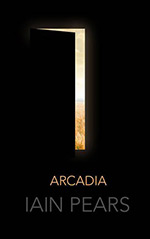
![]() couchtomoon
couchtomoon
9/11/2016
![]()
I joined my mother for lunch one afternoon and made the mistake of walking into the restaurant with a dreamy smile on my face, having started Arcadia that morning and stopped just at that peanut-butter-in-my-chocolate moment when the girl from the time travel machine meets the boy from the fantasy portal. Naturally, I had to explain my silly smile and then the delightfully twee crossover scene until I finally waved it off because ohmygod how embarrassing to talk about SF. in public. To my mother.
To my horror, she texted me that night to thank me for "the great book recommendation" because she just bought it and could now enjoy Arcadia along with me.
For anyone who has actually tried to read Arcadia, you know how this story ends: I never heard back from her about it.
A gentle deconstruction of twee fantasy and gnarly sci-fi that ends up back where it started, and not really doing anything radical enough to justify the heavy-handed metaness of it all. Traditional roles are reinforced, motivations remain conventional, and the adorable moral sticks close to shallow waters: question AUTHOR-ity. It's a case of "too little; too late", when much wilder dismantlings of sci-fi and fantasy have occurred, like, decades ago, but even that could be forgiven if not for the tedium of having to spend 500+ pages with an entire cast of wooden characters and--
--kitschily sudden POV changes.
For a novel that delights in toying with the constructs of science fiction and fantasy storytelling, it is exactly that: a construction project. The parts never meld into an intoxicating dreamlike atmosphere of fantasy nor the cognitive estrangement of science fiction; instead, the nuts and bolts and cables of each chunk-o-fiction are bare, unvarnished, and a tripping hazard. Perhaps the dedicated Apple app is supposed to ameliorate this problem, but I'm an Android user and, besides, this is a book, and one would hope that a book can withstand its own page-after-page format above all others. (On the Cabbage & Kings podcast, I'm pretty sure someone likened the app to those "Choose Your Own Adventure" Books.)
On the podcast, Maureen K. Speller poses a tasty theory that perhaps the unsuccess of the novel is actually Pears' meta-point: throughout the story, an Inklings-like writer discusses the techniques of fiction writing, dissects his own work, and even, at some points, writes the story himself. With so much of the story hearkening to suspicion of authorial authority and criticism of world- and character-building, particularly of the Inklings' ilk, it's a delicious thought, though it does seem exceptionally sadistic to write 500-plus pages of bad writing about a bad writer who writes bad stories that makes the story bad-- on purpose.
http://couchtomoon.wordpress.com